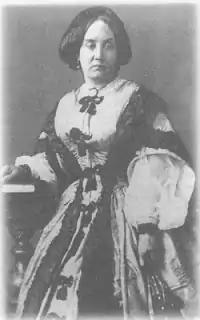
Rosa Guerra (1834 – August 18, 1864) was an Argentine educator, journalist and writer.[1] She was a pioneering woman in Argentine literature.[2]
Biography
Rosa Guerra was born in Buenos Aires, 1834. She founded two newspapers, La Camelia, dedicated to spreading ideas associated with equality between the sexes, and La Educación a religious, poetic and literary newspaper. She also affiliated with the newspapers La Nación Argentina, El Nacional, and La Tribuna.[3] She published the novel Lucía Miranda on the subject of the captive; La Camelia; and a drama in verse, Clemencia. Posthumously, her book of poems, Desahogos del corazón (Relief from the heart), was published. She died August 18, 1864.
La Camellia
Guerra begins her career as a journalist when Juan Manuel de Rosas was removed from power.
La Camelia began publication on April 11, 1852, and printed its last issue on May 11, 1852, printing fourteen editions.[4] The critic Néstor Tomás Auza states, however, that there were actually 31 issues.[5][6][7] [8] The newspaper was written mostly by women, and was financed by subscription. At first, Guerra denied her participation in the project,[6] but later, she acknowledged being its founder. The newspaper had the slogan "Freedom! No license; equality between the two sections" It was one of the first newspapers to openly raise the need for women to have access to education.
Lucia Miranda
The novel Lucía Miranda deals with the subject of a captive, a myth that appeared for the first time recounted by Ruy Díaz de Guzmán,[9] and that was also addressed by Eduarda Mansilla in her homonymous novel. Guerra's novel tells the story of Lucía Miranda, the wife of a Spaniard who accompanies Sebastián Gaboto on his expedition through the Río de la Plata and is captured by the Amerindians in the destruction of Fort Sancti Spiritus. The novel presents a model of a Christian, submissive and faithful woman.[10]
References
- ↑ Landrus, Vanesa M. "Biografía y Obras de Rosa Guerra". eladd.org (in Spanish). Escritoras Latinoamericanas del Sigo XIX. Retrieved 22 August 2021.
- ↑ Pigna, Felipe (10 June 2018). "Rosa Guerra, escritora y pionera del feminismo". www.clarin.com (in Spanish). Retrieved 22 August 2021.
- ↑ Sosa de Newton, Lily (1995). «Rosa Guerra». Narradoras argentinas. 1852-1932. Plus Ultra. p. 32. ISBN 950-21-1218-0.
- ↑ Landrus, Vanessa (July–December 2011). "MUJERES AL MANDO DE LA IMPRENTA: LA EDUCACIÓN CIENTÍFICA DE LA MUJER EN LA PRENSA FEMENINA ARGENTINA DEL SIGLO XIX". Revista Iberoamericana (in Spanish). LXXVII (236–237): 717–730. doi:10.5195/REVIBEROAMER.2011.6850.
- ↑ Auza, Néstor Tomás (1988). Periodismo y feminismo en la Argentina, 1830-1930 (in Spanish). Emecé Editores. ISBN 978-950-04-0797-7. Retrieved 22 August 2021.
- 1 2 Vento, Dainerys Machado (2019). "La estrategia epistolar feminista de Rosa Guerra en el periódico La Camelia". Decimonónica (in Spanish). 16 (1). Retrieved 22 August 2021.
- ↑ Davies, Catherine; Brewster, Claire; Owen, Hilary (2011). South American independence gender, politics, text (en inglés). Liverpool University Press. p. 266. ISBN 9781781387979. OCLC 1100937446.
- ↑ Masiello (1994). "Introducción". Masiello, Francine, ed. La mujer y el espacio público. El periodismo femenino en la Argentina del siglo XIX. Feminaria. p. 14. ISBN 987-99025-5-6.
- ↑ "Conquista y mito blanco". Biblioteca Virtual Miguel de Cervantes (in Spanish). Retrieved 22 August 2021.
- ↑ Rossi Elgue, Carlos Alfredo (29 December 2017). "Lucía Miranda, Myth of the White Captive in the Río de la Plata, from the Sixteenth to the Twentieth Century". Mitologías hoy (in Spanish). 16: 39. doi:10.5565/rev/mitologias.486. Retrieved 22 August 2021.